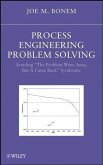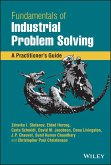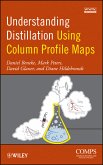This book provides methods to train process operators to solve challenging problems. The book is split into two parts. The first part consists of two parts; first developing a daily monitoring system and second providing a structured 5 step problem solving approach that combines cause and effect problem solving thinking with the formulation of theoretically correct hypotheses. The 5 step approach emphasizes the classical problem solving approach (defining the sequence of events) with the addition of the steps of formulating a theoretically correct working hypothesis, providing a means to test the hypothesis, and providing a foolproof means to eliminate the problem. The initial part of the book focuses on defining the problem that must be solved and obtaining the location, time and quantity based specifications of the problem. This part of the book also presents techniques to find and define problems at an early point before they progress to the critical level. The second part of the book deals with the utilization of fundamental chemical engineering skills to develop a technically correct working hypothesis that is the key to successful problem solving. The primary emphasis is on simple pragmatic calculation techniques that are theoretically correct. It is believed that any operator can perform these calculations if he is provided the correct prototype. Throughout the book, the theory behind each pragmatic calculation technique is explained in understandable terms prior to presenting the author's approach. These techniques have been developed by the author in 50+ years of industrial experience. The book includes many sample problems and examples of real world problem solving. Using these techniques, theoretically correct working hypotheses can be developed in an expedient fashion.
Dieser Download kann aus rechtlichen Gründen nur mit Rechnungsadresse in A, B, BG, CY, CZ, D, DK, EW, E, FIN, F, GR, HR, H, IRL, I, LT, L, LR, M, NL, PL, P, R, S, SLO, SK ausgeliefert werden.









